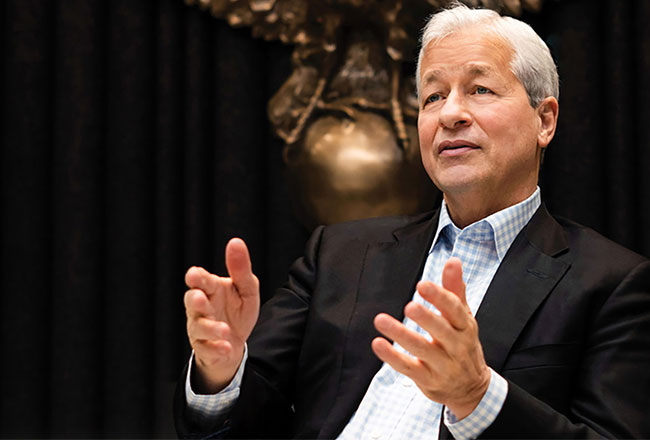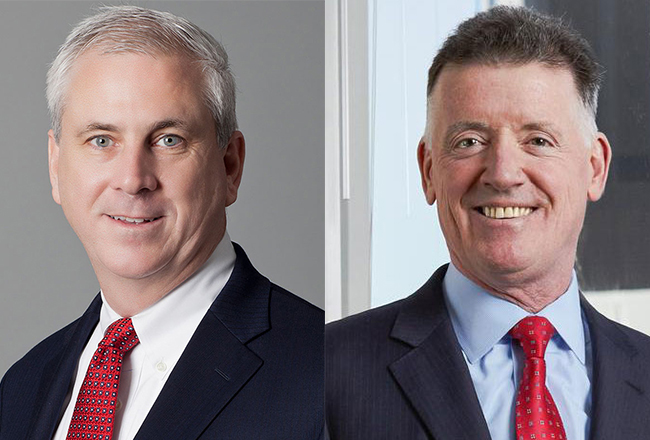The chairman and CEO of JPMorgan Chase & Co., Jamie Dimon, has called on both Republicans and Democrats to realize that the nation”™s problems need to be solved using collaboration, not partisan politics.

Dimon issued his annual letter to shareholders of the company. This year”™s letter was actually a 30,000-word document that set down Dimon”™s views on contemporary issues in addition to reporting on the fiscal health of JP Morgan Chase, which he said was fine despite the pandemic.
“Democrats should acknowledge Republicans”™ legitimate concerns that money sent to Washington often ends up in large wasteful programs, ultimately offering little value to local communities. They could acknowledge that while we need good government, it is not the answer to everything,” Dimon said.
“Republicans need to acknowledge that America can and should afford to provide a proper safety net for our elderly, our sick and our poor, as well as help create an environment that generates more opportunities and more income for more Americans. Republicans could acknowledge that if the government can demonstrate that it is spending money wisely, we should spend more ”“ think infrastructure and education funding. And that may very well mean higher taxes for the wealthy. Should that happen, the wealthy should keep in mind that if tax monies improve our society and our economy, those same individuals will be, in effect, among the main beneficiaries.”
Dimon sees strong growth ahead for the U.S. economy, due in large measure to the government”™s pandemic rescue actions that have funneled extra cash into the pockets of consumers.
“While the government”™s actions were a benefit to banks, there is no question the banks were able to weather a terrible storm while reserving extensively for potential future loan losses. Importantly, the Fed conducted two additional severely adverse Comprehensive Capital Analysis and Review (CCAR) stress tests, which projected bank results under extreme unemployment, GDP loss, market disruption and a smaller government stimulus,” Dimon said.
“The result showed that banks could withstand this extreme outcome while continuing to finance the economy. I also have very little doubt that if the severely adverse scenario played out, JPMorgan Chase would perform far better than the stress test projections.”
Dimon said one issue encountered during 2020, which will continue to be significant, is cybersecurity.
“We cannot overemphasize the importance of cyber risk, not just to our bank (we spend more than $600 million a year on cybersecurity) but also to our customers, countries, economies and critical industries (i.e., telecom and power). We have pointed out to our shareholders before that having disciplined cyber hygiene is almost as important as the money you spend.,” Dimon said.
“Threats to our cybersecurity need urgent attention from our government as issues of national security and impediments to trade. Governments should build on prior agreements in the United Nations, recognizing the applicability of international law to cyberspace and enforcing obligations to hold bad actors accountable.”
Dimon said there are challenges ahead for the U.S., and health care is an ongoing one.
“Although the United States has some of the best health care in the world (i.e., doctors, pharmaceutical care and innovation) and many people from other countries come here when they need serious medical attention, the problems associated with health care are serious, rampant and obvious.
“Our costs are more than twice those of the developed world without justification by better outcomes,” Dimon said. “There is no transparency in pricing, with patients legitimately complaining of hidden costs. And chronic care is not necessarily managed properly. More than 30 million Americans are uninsured, and we are falling short in basic wellness.”
Dimon noted that the Covid-19 pandemic changed the way people work in many ways but, for the most part, only accelerated ongoing trends.
“While working from home will become more permanent in American business, it needs to work for both the company and its clients,” Dimon said. “I believe our firm”™s on-site versus remote work will sort out something like this: generally speaking, we envision a model that will find many employees working in a location full time. That would include nearly all of the employees in our retail bank branches, as well as jobs in check processing, vaults, lockbox, sales and trading, critical operations functions and facilities, amenities, security, medical staff and many others.
“Some employees will be working under a hybrid model (e.g., some days per week in a location and the other days at home). And, a small percentage of employees, maybe 10%, will possibly be working full time from home for very specific roles.”
Dimon said that JPMorgan Chase still intends to build a new headquarters in New York City. It will house between 12,000 to 14,000 employees.
Dimon emphasized that Covid-19 has taken more American lives than the total lost in World War II, the Korean War and the Vietnam War combined. He outlined threats the country survived in 2020 as including “the brutal murder of George Floyd and the racial unrest that followed; the divisive 2020 presidential election, culminating in the storming of the Capitol and the attempt to disrupt our democracy; and the seemingly inevitable, but nonetheless alarming and unnerving, rise of China, threatening America”™s global preeminence.”
Dimon warned that while the country”™s might and resiliency previously strengthened its position in the world, this time may be different.
“China”™s leaders believe that America is in decline. They believe this not only because their country”™s sheer size will make them the largest economy on the planet by 2030 but also because they believe their long-term thinking and competent, consistent leadership have outshone America”™s in so many ways,” Dimon said.
“The Chinese see an America that is losing ground in technology, infrastructure and education ”“ a nation torn and crippled by politics, as well as racial and income inequality ”“ and a country unable to coordinate government policies (fiscal, monetary, industrial, regulatory) in any coherent way to accomplish national goals. Unfortunately, recently, there is a lot of truth to this.”
Dimon expressed concern at the rise in falsehoods being spread on social media and decried the reality that most media and individuals barely have time to focus on the issues.
“We are stymied by self-interest, selfishness and the buildup of bureaucratic plaque and institutional sclerosis,” Dimon said.
He found a prime example of excessive self-interest in there being 17,000 registered lobbyist contracts for special interest groups in Washington, D.C., including business-related groups and banking and financial services.
“We all deserve our share of the blame for using the balkanized government, bureaucracy and lack of transparency to further our own interests ”“ not necessarily the country”™s,” Dimon said. “This includes business, unions, state and local governments, and individuals.
“All of us failed to properly heed President John F. Kennedy”™s appeal: ”˜Ask not what your country can do for you ”“ ask what you can do for your country.”™”






















